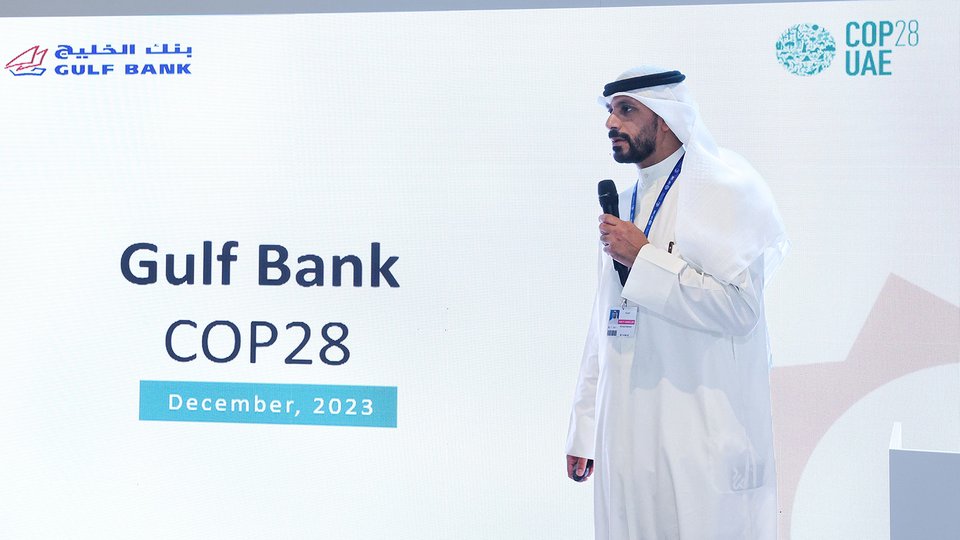06/12/2023
Gulf Bank Highlights Sustainability Initiatives at "COP28"
Conducted in Dubai, involving 198 countries and attended by over 70,000 individuals
- Ahmed Al Amir: Our commitment to sustainability extends both within and beyond the bank through impactful initiatives.
- Our third annual sustainability report has been published, and we are initiating our ESG Strategy 2024/2030.
- Supporting the National Sustainability Agenda within Vision 2035, we actively participate in financing various sustainable development projects.
- Our contributions to financing projects like Al-Shagaya and Clean Fuels are part of a broader portfolio.
- Executing an ambitious plan, we are developing our branch network in alignment with sustainability standards, including the upcoming launch of the first environmentally friendly branch.
- Introducing an initiative to reshape societal norms, encouraging the use of reusable bags.
- Achieving a reduction in carbon emissions and successfully recycling 22.3 tons of e-waste.
In its ongoing commitment to instill sustainability principles in society, Gulf Bank actively participated in the State of Kuwait pavilion at the 28th meeting of the Conference of the Parties (COP28), part of the United Nations Framework Convention on Climate Change, held in Dubai from November 30 to December 12, 2023. The conference drew a substantial audience of over 70,000 participants from 198 countries, encompassing heads of state, government leaders, ministers, corporate officials, representatives from international organizations, academics, and media professionals.
Significant this year is the conference's notable departure, shifting from mere negotiations to a concentrated pursuit of concrete solutions aimed at tackling the impacts of climate change, all the while advancing objectives related to sustainable development.
During a visual presentation held in one of the conference sessions, Mr. Ahmed Al-Amir, Gulf Bank's Deputy General Manager for Corporate Communications, elaborated on the bank's endeavors to solidify sustainability principles both within and beyond its operations. These initiatives reached fruition with the publication of Gulf Bank's third annual Sustainability Report, highlighting noteworthy accomplishments in the realms of environmental stewardship, social responsibility, and corporate governance.
Al-Amir emphasized the bank's close collaboration in supporting and expediting the national sustainability agenda aligned with Kuwait Vision 2035. Gulf Bank strategically implements initiatives designed to significantly contribute to fostering a sustainable mindset within the community. This involves adopting responsible practices proactively in environmental, social, and corporate governance domains, alongside providing exceptional financial and banking services. Furthermore, Gulf Bank remains at the forefront of innovation, by offering cutting-edge digital solutions to meet the evolving needs of its customers.
A Comprehensive ESG Strategy and Sustainable Initiatives for the Future
Highlighting the bank's ongoing initiatives, he emphasized the current development of its Environmental, Social, and Governance (ESG) Sustainability Strategy 2024/2030. This strategy is set to function as the foundational framework directing the bank's sustainability initiatives in the forthcoming phase.
Concurrently, a sustainability committee has been established at the highest echelon within the bank, chaired by a member of the Board of Directors, to supervise the implementation of sustainability programs. Additionally, high-level training programs are being prepared for senior leaders in the bank, aiming to instill sustainability as a pivotal focus across all operations and services.
Al-Amir stressed on Gulf Bank's significant role in funding sustainable development projects, highlighting its position as one of the leading banks in Kuwait and the broader region. Specifically, he pointed to the bank's active involvement in financing an extensive portfolio of sustainable development projects.
Sustainability Initiatives and Collaborations
Highlighting significant projects supported by Gulf Bank in Kuwait, Al-Amir remarked, "We played a key role in financing the Al-Shagaya renewable energy project and the Clean Fuels Project, addressing both local and international demand for clean fuels among numerous other sustainable endeavors."
Al-Amir further highlighted the bank's collaboration with five major cooperative societies and the Environment Public Authority in Kuwait, unveiling an impactful initiative for environmental sustainability. This initiative aims to foster a societal shift towards the use of reusable bags, reducing reliance on plastic bags. The initiative aligns with Goal No. 17 of the sustainable development goals, highlighting the importance of enhancing implementation methods through extensive state-level partnerships across different sectors.
He also stressed Gulf Bank’s continuous dedication to the annual Environment Month initiative, organized by the Scientific Center. This involvement encompasses activities commemorating World Recycling Day, World Water Day, World Aquatic Animals Day, and World Health Day.
Sustainable Practices Within the Bank
In contrast, Al-Amir highlighted various initiatives implemented within the bank to cut-down on greenhouse gas emissions, decrease paper usage, advocate for environmental cleanliness, reduce waste, and shift towards energy-efficient lighting.
He pointed out that, as part of an ambitious plan to make its branch network environmentally friendly and increase reliance on renewable energy, the bank has renovated several branches, including its headquarters in the capital. Moreover, a new environmentally friendly branch is set to open in the Sabah Al-Ahmad area soon. Additionally, the bank has maintained its dedication to recycling e-waste by partnering with a specialized recycling company, ensuring the safe disposal of around 22.3 tons of electronic waste.
"At Gulf Bank, we prioritize implementing the highest standards of Environmental, Social, and Governance (ESG) sustainability to ensure that our operations, initiatives, and investments align with the optimal sustainability model both now and in the future," concluded Al Amir.
The action plan for COP28 focused on four primary goals: accelerating a systematic, responsible, fair, and rational transition in the energy sector; establishing mechanisms for climate finance; ensuring the well-being of people and improving lives and livelihoods; and promoting inclusivity in all these endeavors.
These objectives respond to the call for a 43% reduction in carbon emissions by 2030, followed by achieving net-zero emissions by mid-century, with the ultimate aim of limiting the temperature rise to 1.5°C.
